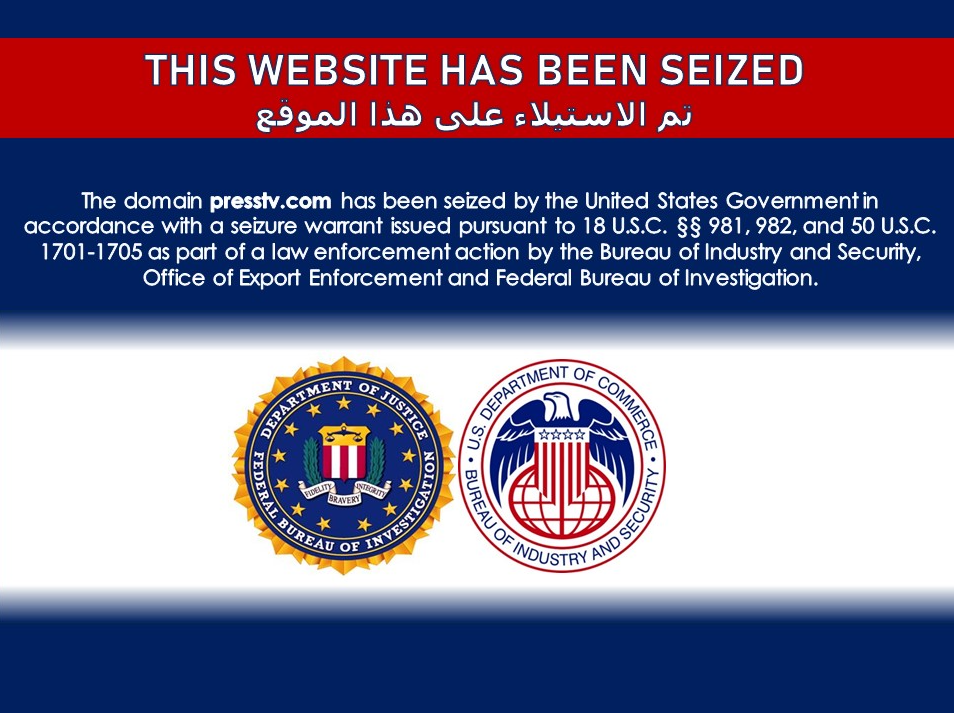August 06, 2021

The United States has seized another 33 Iranian state-linked website domains it accuses of spreading disinformation.
Among the sites seized was presstv.com, the US-based outlet of Iranian state broadcasting’s English-language television. But PressTV was not blacked out as it can still be received over the internet at presstv.ir. The US cannot touch that Iranian-based domain, which has identical content to presstv.com. So the action against PressTV really doesn’t mean anything.
All 33 websites were said to be owned by Iran’s Islamic Radio and Television Union (IRTVU), a part of the Qods Force. Another three websites operated by the Iran-backed Kataib Hizballah militia in Iraq were also seized, the US Justice Department said in a statement June 22.
The US Office of Foreign Assets Control (OFAC) last year designated IRTVU for being owned or controlled by the Qods Force, the Justice Department said. That designation was in response to the Islamic Republic targeting the US electoral process “with brazen attempts to sow discord” among voters by spreading disinformation online.
The Justice Department said the sites disguised themselves as news organizations to target the United States with disinfor-mation campaigns designed to set Americans against one another.
The Justice Department said IRTVU is a US-based company, which did not obtain a license from OFAC prior to using the domain names, a violation of US sanctions.
The Iranian state-linked websites that abruptly went offline include state television’s English-language PressTV, the Yemeni Houthi rebels’ Al-Masirah satellite news channel, and Iranian state television’s Arabic-language channel, Al-Alam.
The Intercept and Responsible Statecraft, two US news websites, said the broad US seizure went far beyond fake news sites run by the Islamic Republic. It said some of the sites were run by Shia groups opposed to the Islamic Republic. One they cited is Karbala TV, which they said is linked with Grand Ayatollah Ali Sistani, who firmly opposes the Islamic Republic.
David Greene, civil liberties director at the Electronic Frontier Foundation, said, “We’ve seen this for years, where well-meaning efforts to address disinformation campaigns or terrorist propaganda have these serious human rights impacts, because they capture too much.”
Numerous Iranian news outlets reported the seizures while commenting that the US move “demonstrates that US calls for freedom of speech are lies.”
It is not the first time that the US has seized domain names of sites it accuses of spreading disinformation around the world. Last October, US prosecutors seized a network of web domains they said were used in a campaign by the Pasdaran.
The US Justice Department said then that it had taken control of 92 domains used by the Pasdaran to pose as independent media outlets targeting audiences in the United States, Europe, the Middle East and Southeast Asia.
“We are using all international and legal means to … condemn … this mistaken policy of the United States,” Mahmud Vaezi, the director of the Iranian president’s office, told reporters June 23. “It appears not constructive when talks for a deal on the nuclear issue are under way.”
The legal basis for the IRTVU seizures came from a 2018 Donald Trump executive order, which authorizes sanctions against foreign entities interfering in US elections. The US has seized Iranian sites accused of spreading disinformation before, but none as prominent as PressTV, the country’s flagship international broadcaster launched in 2007. Like its counterparts, Russia’s RT and China’s CGTN, PressTV bills itself as an alternative to the Western-centric perspective of other global English-language news outlets.
It does not appear that this seizure was the result of any content on PressTV itself. The issue, rather, is its links to the IRTVU and the Pasdaran, which were sanctioned by the Treasury Department shortly before the election last year “for attempting to influence elections in the United States.”
According to a recent National Intelligence Council report partially declassified in March, Iran “carried out an influence campaign during the 2020 US election season intended to undercut the reelection prospects of former President Trump and to further its longstanding objectives of exacerbating divisions in the US, creating confusion, and undermining the legitimacy of US elections and institutions.”
In one of the best publicized examples of this campaign, Iranian cyber actors sent fake emails to Democratic voters in several US states, purportedly from the Proud Boys, threatening them with violence if they didn’t vote for Trump.
This is a very different sort of influence operation from PressTV’s content, which is not pretending it’s anything it’s not—i.e., an outlet of the Islamic Republic. Emerson Brooking, a senior fellow at the Atlantic Council who studies online disinformation, told Slate that while Iran typically gears its online influence operations toward spreading and promoting its own official propaganda, some of its actions during the 2020 election were “more following the Russian playbook, to be trying to foment violence or discord in the US.”
He sees the US govern-ment’s enforcement action this week as “a way to send a message the Iranian interference actions were unacceptable.”
